
Israel has imposed a complete block on humanitarian aid into Gaza since March 2, with hundreds of trucks with lifesaving aid waiting at the border. Now many of Gaza’s kitchens have closed, and Palestinians face mass starvation as rations run low. We speak with Alex de Waal, executive director of the World Peace Foundation at Tufts University, author of Mass Starvation: The History and Future of Famine. “The majority of people in Gaza are facing emergency or catastrophic levels of food insecurity,” says de Waal. “Rations are getting low, and the poorest and most vulnerable are beginning to starve and die.”
Transcript
AMY GOODMAN: This is Democracy Now!, democracynow.org, The War and Peace Report. I’m Amy Goodman, with Nermeen Shaikh.
NERMEEN SHAIKH: We end today’s show in Gaza, where Israel’s brutal assault continues as Palestinians are commemorating the 77th anniversary of the Nakba, which means “catastrophe” in Arabic, when some 700,000 Palestinians fled or were violently expelled from their homes by Israel’s founders. Officials in Gaza say Israeli strikes have killed over a hundred people over the past day, the majority of them children and women.
Earlier today, at the state dinner in Qatar, President Trump said he wants the U.S. to “take” Gaza and turn it into a “freedom zone.”
PRESIDENT DONALD TRUMP: Well, we’re working very hard on Gaza. And Gaza has been a territory of death and destruction. … United States get involved and make it just a freedom zone, have a real freedom zone.
AMY GOODMAN: “A freedom zone.” This comes amidst mounting warnings of “Starvation in Gaza,” which is the headline of our next guest’s new piece in the London Review of Books. Alex de Waal, executive director of the World Peace Foundation at Tufts University, author of the book Mass Starvation: The History and Future of Famine.
Welcome back to Democracy Now! Congratulations on the efforts of so many at Tufts, and also outside of Tufts, to have Rümeysa released, the Turkish student who was a Fulbright scholar and was taken by masked ICE agents on the streets of Somerville, Rümeysa Öztürk, now out of an ICE jail. Alex, if you can start off by laying out what you found in your new piece for the London Review of Books, “Starvation in Gaza”?
ALEX DE WAAL: So, just a couple of days ago, the United Nations Integrated Food Security Phase Classification — which is a real mouthful. It’s a system, it’s a collaboration of different humanitarian agencies. And they undertook a survey. It’s the fifth such survey since the beginning of the war, in the most recent war in Gaza, some 19 months ago. They undertook a survey of food security and malnutrition. And what they found was, yet again, that the majority of people in Gaza are facing emergency or catastrophic levels of food insecurity, and levels of malnutrition are rising fast. And this is directly related to the total blockade imposed upon the Gaza Strip at the beginning of March.
And normally in situations of famine, there are many complex factors that work in between the level of food availability and children getting hungry and beginning to die in large numbers. In the case of Gaza, it’s actually, sadly, a lot more straightforward. There’s really — the only food that is available is that that is permitted to enter by Israel, and those food stocks are running out. Rations are getting low, and the poorest and most vulnerable are beginning to starve and die.
NERMEEN SHAIKH: Well, you write in your piece, Alex de Waal, that, quote, “Gaza is an anomaly, a laboratory in which we will discover how much nutritional stress a population can withstand before succumbing en masse.” So, if you could elaborate on that and whether that is, indeed, the conclusion that was reached in the IPC report?
ALEX DE WAAL: So, a normal, healthy adult will last somewhere between 60 and 80 days deprived of all nutrition. Now, we haven’t got to that stage, but children perish much more quickly, and there are significant numbers of children who need specialized feeding, need food that cannot be readily prepared with just the food that is available, with the lack of clean water, the lack of electricity supplies. So we are seeing the most vulnerable already succumbing.
And there are two scenarios that were laid out in this report. One is a situation in which the status quo continues, the level of blockade and the level of destruction continue unimpeded, in which case mass starvation, famine is inevitable. It is a question of weeks before that unfolds.
The second scenario is if the Israeli-U.S. plan for setting up an alternative humanitarian system comes into play. Now, the background to this is that Israel wants to debar the UNRWA and the United Nations and other international humanitarian organizations from being present on the ground in Gaza, and to put humanitarian provision in the hands of a new system, a new method, a new scheme, the Gaza Humanitarian Foundation. And not many details are available about this, but what is known is that the plan is to have just four distribution centers in a small part of Gaza supplying at most 60% of the population with minimum rations. And the food would be brought and distributed by members of this new foundation, including U.S. private military contractors, protected by the IDF. And it would simply be those rations and basic hygiene and medical kits. There would be no reconstruction of infrastructure, no specialized feeding for malnourished children, etc. Now, even if this were to work, the conclusion of the IPC doesn’t spell it out in quite so many words, but it’s pretty clear the conclusion is mass starvation would still unfold, just somewhat more slowly.
NERMEEN SHAIKH: So, Alex, could you also talk about the fact of this — this concept of yours of surveillance humanitarianism? How does the aid scheme that you’ve just been talking about, that is proposed by the Israelis and backed by the Americans, fit into that. How precisely would it work? You’ve also said the plan is, quote, “an individualised version of late colonial counterinsurgency.”
ALEX DE WAAL: Back in the 1950s, the British government mounted an anti-communist counterinsurgency in Malaya, and they explicitly called it Operation Starvation. And the idea was that every individual who was in a protected village would — and was properly accredited with the authorities, would receive enough food. And every item of food was counted going into those protected villages. And outside the protected villages, where the communist guerrillas were able to roam, no food would be available. They would be forced to starve.
Now, what we’re seeing is a version of this, a much more sophisticated version, being implemented by Israel today. So, clearly their intent is that no food should get into the hands of Hamas. And they have details about every individual in Gaza. So, the plan, by inference, is that they would screen every individual, and they would put accredited individuals who have no link to Hamas on the distribution list. Those individuals would be notified by text message to come to pick up the rations that they are allocated, at a certain time, in a certain place. And their identities would be verified by face recognition and other technologies. And then they would go. They would take those rations. Those rations would presumably be just enough for a few days, perhaps a week, so that they would — there would be very little chance of them falling into the hands of anybody else. And then they would have to come back.
So, it is — the welfare, indeed the survival, of every Palestinian family in Gaza would be dependent upon, on a week-to-week basis, on this type of surveillance and accreditation system. And you can look at it as the sort of the counterpart of the surveillance and AI algorithms, the Lavender system that is being used by Israel to identify members of Hamas whom they are targeting for assassination, so they would have a counterpart for feeding the people whom they are prepared to keep alive.
AMY GOODMAN: Meanwhile, Alex de Waal, The New York Times is reporting some Israeli officials are privately admitting Gaza is on the brink of starvation, and warn of the effects if the blockade is not lifted, since it takes a while, though there are thousands of trucks waiting outside to get in, to increase the humanitarian aid. And you have President Trump today in Qatar talking about Gaza being a “freedom zone” controlled by the United States? Your response?
ALEX DE WAAL: I’m not quite sure what President Trump means by a “freedom zone.” But I think it is clear across the board, with the information that we have — and I have no doubt Israel has pretty much the same information; they may just dispute some of the details — but the overall picture is completely clear that something dramatic is going to have to be done to prevent mass starvation and famine unfolding in the very near future in Gaza. The situation cannot be allowed to get to the brink and then just pull back slightly from the brink, as has been happening when the Israelis opened supply routes and food distribution a year ago, and again with the ceasefire a few months ago. The population simply cannot withstand this type of pressure for really any longer without the utmost catastrophe unfolding.
NERMEEN SHAIKH: Well, Alex, you conclude your piece by saying that Israel may, quote, “do just enough to keep most Palestinians alive.” But “[w]hether this prevents the destruction of Palestinians in Gaza as a group is another matter.” If you could say what you mean by that? What do you imagine Israel will do?
ALEX DE WAAL: So, what we see in this process of, if it unfolds, this sort of individually targeted surveillance humanitarianism is keeping individuals and families alive, but dismantling the entire structure of society. Now, clearly the dismantling of Hamas is the political and military goal of Israel. But if it goes further, towards the dismantling of society as a whole, which is one of the things that we often see during famines, it’s not just that individualized biological suffering. It is the tearing apart of social bonds, the collective humiliation, the degradation of society. That is the deep trauma, the profound experience of famine. If that is allowed to proceed, then Palestinian society, as it has existed, will be irrevocably changed, torn apart, traumatized. And if Israel knowingly does this, then it will be culpable not just of the war crime of starvation, but of the destruction of the Palestinian people of Gaza.
AMY GOODMAN: Alex de Waal, thank you so much for being with us, executive director of the World Peace Foundation at Tufts University, author of the book Mass Starvation: The History and Future of Famine. We’ll link to your piece in the London Review of Books headlined “Starvation in Gaza.”
That does it for our show. Democracy Now! currently accepting applications for director of technology. Check democracynow.org. I’m Amy Goodman, with Nermeen Shaikh.

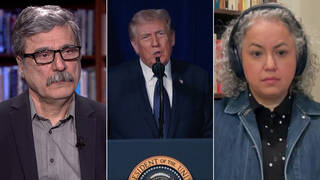
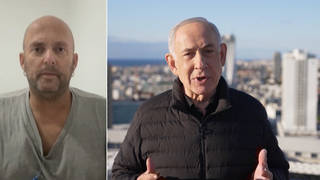
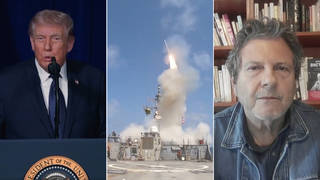
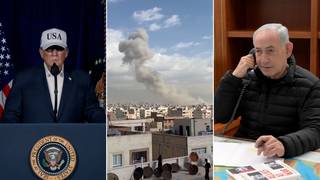





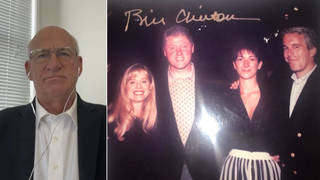
Media Options